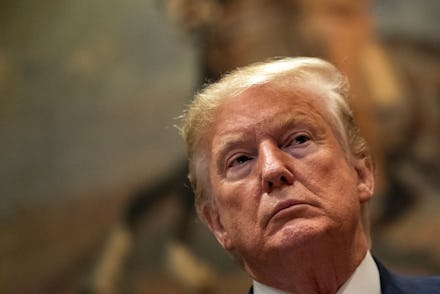Trump's trade war is coming for your French wine and cheese

Taxes are always such a touchy topic, especially when the conversation is happening between countries. This summer, France signed a digital services tax, which not everyone was happy about. Now, the Trump administration has proposed tariffs on French goods, claiming that the country's new tax discriminates against U.S. companies.
In July, France's President Emmanuel Macron signed legislation that would start taxing some of tech's biggest companies. Basically, the tax is meant to ensure that big tech companies can't skirt paying taxes in the European Union.
Although some of the companies are headquartered in the United States, the tax was based on where digital activity takes place. Still, France's tax resulted in an investigation by the U.S. Trade Representative (USTR) which released its findings on Monday.
In a press release, the USTR claimed that the tax "is inconsistent with prevailing principles of international tax policy, and is unusually burdensome for affected U.S. companies." The USTR proposed tariffs up to 100 percent on French products, including sparkling wine and several types of cheeses.
If you're unfamiliar with France's digital services tax (DST), it is a bit of an interesting model because it focuses on revenue instead of profit. Under the DST, companies making more than €750 million in global revenue and €25 million in France have to pay 3 percent of French revenue in taxes.
Techcrunch reported that the tax targets tech companies in two categories: marketplace (think Uber and Amazon's marketplace) and advertising (Facebook, Google).
It is a little ironic that France will tax big tech companies like Amazon before the United States actually cracks down. In 2018, Amazon paid $0 in federal income tax on $11 billion in profit. But, those companies being included explains why the United States felt the need to respond.
"France just put a digital tax on our great American technology companies. If anybody taxes them, it should be their home Country, the USA," Trump tweeted in July. "We will announce a substantial reciprocal action on Macron’s foolishness shortly. I’ve always said American wine is better than French wine!"
“USTR’s decision today sends a clear signal that the United States will take action against digital tax regimes that discriminate or otherwise impose undue burdens on U.S. companies,” USTR Robert Lighthizer said in the press release.
However, France isn't going to quietly accept tariffs on its goods. In response to the USTR's proposal, French Economy Minister Bruno le Maire promised a "strong" European Union response.
"This is not the sort of behavior one expects from the United States with respect to one of its main allies, France, and to Europe in general," Le Maire said, according to CBS News.
It seems that the USTR doesn't want to end with France, either. The agency may start looking into the digital services taxes of other EU countries, including Austria, Italy, and Turkey. This could potentially lead to the United States trying to introduce tariffs on goods from each of those countries or an all-out trade war with the European Union.